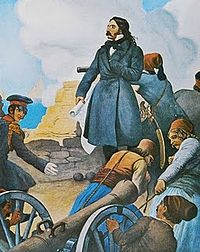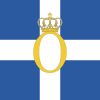Alexandros Mavrokordatos
Alexandros Mavrokordatos | |
|---|---|
| Αλέξανδρος Μαυροκορδάτος | |
o.s.) | |
| Preceded by | Office established |
| Succeeded by | Petrobey Mavromichalis |
Prime Minister of Greece | |
| In office 12 October 1833 – 31 May 1834 (o.s.) | |
| Monarch | Otto |
| Preceded by | Spyridon Trikoupis |
| Succeeded by | Ioannis Kolettis |
| In office 24 June 1841 – 10 August 1841 (o.s.) | |
| Preceded by | Otto |
| Succeeded by | Otto |
| In office 30 March 1844 – 4 August 1844 (o.s.) | |
| Preceded by | Konstantinos Kanaris |
| Succeeded by | Ioannis Kolettis |
| In office 16 May 1854 – 29 October 1855 (o.s.) | |
| Preceded by | Konstantinos Kanaris |
| Succeeded by | Dimitrios Voulgaris |
| Personal details | |
| Born | 11 February 1791 English Party |
| Spouse | Chariklia Argiropoulos |
| Relations | Mavrokordatos family Cantacuzino family Caradja family |
| Relatives | Alexander Mavrokordatos (great-great-grandfather) Nicholas Mavrocordatos (great-grandfather) Șerban Cantacuzino (great-grandfather) Nicholas Caradja (grandfather) John Caradja (uncle) Charilaos Trikoupis (nephew) |
| Education | Phanar Greek Orthodox College |
| Alma mater | University of Padua |
| Occupation | Revolutionary Politician |
| Military service | |
| Allegiance | |
| Branch/service | |
| Battles/wars |
|
Alexandros Mavrokordatos (
Biography
In 1812, Mavrokordatos went to the court of his uncle
Mavrokordatos was a very wealthy, well educated man, fluent in seven languages, whose experience in ruling Wallachia led many to look towards him as a future leader of Greece.

He commanded the advance of the Greeks into western Central Greece the same year, and suffered a serious defeat at
Mavorokordhatos's English sympathies brought him, in the subsequent strife of factions, into opposition to the
After the
From 1834 onwards, he was Greek envoy at
He died in Aegina on 18 August 1865.[2]
Family tree
Nicolae Caradja | |||||||||||||||||||||||
| Smaragda Caradja | |||||||||||||||||||||||
References
- Old Style.
- ^ a b c d e One or more of the preceding sentences incorporates text from a publication now in the public domain: Chisholm, Hugh, ed. (1911). "Mavrocordato s.v. Prince Alexander Mavrocordato". Encyclopædia Britannica. Vol. 17 (11th ed.). Cambridge University Press. p. 917.
- ^ a b c Brewer 2011, p. 127.
- ^ Brewer 2011, pp. 127–128.
- ^ Brewer 2011, p. 128.
- ^ Brewer 2011, p. 130.
- ^ Brewer 2011, p. 133.
- ^ Brewer 2011, pp. 133–134.
- ^ a b Brewer 2011, p. 134.
- ^ a b Brewer 2011, p. 146.
- ^ Brewer 2011, pp. 184–185.
- ^ Brewer 2011, p. 191.
- ^ Brewer 2011, p. 207.
- ^ Brewer 2011, p. 266.
Works cited
- E. Legrand, Généalogie des Mavrocordato (Paris, 1886).
- Brewer, David (2011). The Greek War of Independence : the struggle for freedom from Ottoman oppression. New York, NY: Overlook. OCLC 706018492.

